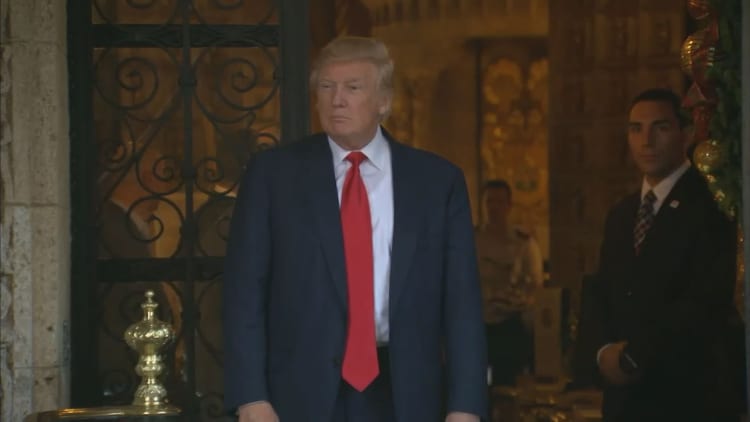
The tumult surrounding President Donald Trump has produced strikingly little shift in public opinion.
Chalk that up to a growing political tribalism.
Yet the real tests of tribal solidarity have barely begun. His actual governance on issues like taxes, trade and health care will present escalating potential strains for Trump's diverse coalition and agenda.
Consider the latest A minority of 44 percent now approves of Trump's performance as president, just slightly below the 46 percent of the popular vote he won last November. Some 48 percent disapproves, matching the percentage that voted for Hillary Clinton.
Among those who identify with a political party, 9 percent of Democrats approve; 8 precent voted for him. Fully 86 percent of Republicans approve, just a tick below the 88 percent who voted for him.
Tribal feeling, sometimes described as group solidarity or ethnocentrism, reflect survival instincts that have always impelled human beings to distinguish friends from foes. In recent decades, that sentiment has dramatically strengthened within the American party system. The increasing congruence of ideology and partisanship has so sharpened the divide that 9 in 10 Democrats and Republicans now routinely back their party's nominee.
By race, solidarity remains strong. Among African-Americans, just 14 percent approve of Trump's job performance; among Hispanics his support is at 33 percent. Among whites, 52 percent approve.
Among African-Americans, political solidarity surged in Democrats' favor after Republican presidential nominee Barry Goldwater opposed the Civil Rights Act of 1964. A similar trend occurred among Hispanics after 2004, as Republicans took a hard line against legal status for undocumented immigrants.
Lately, solidarity among whites has increased in Republicans' favor. As the U.S. Census projects America will become a majority minority nation within three decades, psychologists at UCLA in a 2015 study found fear among whites of losing their status as the "prototypical" ethnic group.
That fear, they wrote, represents "a novel, emerging source of resistance toward diversity in 21st Century America." Trump harnessed it better than anyone in last year's Republican field, as the first African-American president prepared to leave office.
In early 2016, political scientists from the University of Michigan and Vanderbilt examined data from the American National Election Study on voter attitudes toward candidates and different racial, ethnic and religious groups.
Their conclusion: Group solidarity among whites represented Trump's critical edge.
"Ethnocentrism among white Americans explains Trump's astonishing emergence," concluded Donald Kinder and Cindy Kam. In November, Trump defeated Clinton by 20 percentage points among whites.
Yet the concrete allocation of governing rewards will test the allegiance of two different groups of Trump supporters: financially squeezed blue-collar voters who welcome crackdowns on immigration, trade deals and crime; and affluent pro-business Republicans who seek cuts in taxes and regulations.
The Affordable Care Act that Trump pledges to repeal would eliminate insurance subsidies for many blue-collar workers who backed him, while cutting taxes for the wealthy. The tax cut plan he campaigned for would also disproportionately benefit high-earners.
In the name of working-class allies, Trump has scuttled the That disappointed business supporters who have flourished in the globalized economy. His , now stymied in federal court, triggered complaints from Silicon Valley and other multinational U.S. corporations.
In any event, solidarity within Trump's coalition could hold. An experiment by British psychologists, offering different groups of schoolboys choices of monetary rewards, found that individual teenagers chose options that benefited their groups, even if they received less themselves.
Members of groups, Vanderbilt's Kam explained, often prefer "the self-esteem they derive from where their in-group stands," regardless of material self-interest.
Yet research also shows that such solidarity weakens with higher levels of education. That means that upscale Trump supporters may be most susceptible to defection if policies adversely affect them, Kam speculated. The NBC/WSJ poll shows that, compared to Election Day, Trump's standing among college-educated whites has fallen slightly more than among non-college whites.


